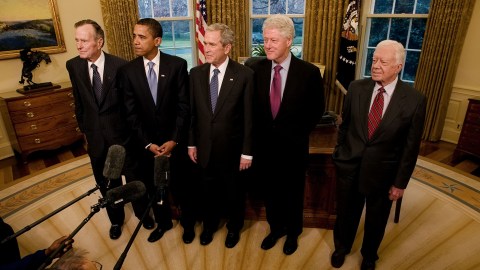Do presidents removed from office still retain honorific titles?

David Hume Kennerly/GettyImages
- The President of the United States is entitled “Mr/Ms. President,” “the honorable,” and “their Excellency” depending on the context.
- The first two of these follow a person all of their life, including long after they leave the office that gave it to them.
- The question of whether an impeached president could still be called “the honorable” is still open, since no precedent exists for it.
Unless you’ve been living under a rock or subscribing to some odd legal advice, you probably know that the House of Representatives has impeached President Trump. He joins Bill Clinton and Andrew Johnson as only the third president to have been given the strictest reprimand the lower house of Congress can bestow[1]. However, neither Johnson or Clinton were removed from office by the Senate.This means that the United States is in mostly uncharted territory, with only two examples to look at for precedent, one of which was over 150 years ago. Many questions, from what rules the Senate should apply to how to get a president to leave the White House, remain.
One of them is how to refer to a previous president who was dishonorably discharged from their duties. After all, we currently refer to former presidents as “Mr. President” and afford them the honorific of the “honorable.” But, would this be different?
A question of titles
What to address the president has been a continuing question in American history. John Adams famously wanted to give the president the exhausted honorific of his “majesty” to help assure the office would be respected. While his fellow revolutionaries Jefferson and Franklin found his proposal to be insane. Other proposals at the time included a reference to the old Dutch Republic with the title his “High Mightiness.”
In the end, the simple title of “Mr. President” won out. It did not extend beyond the term of office, however, and ex-presidents reverted to their old titles after returning to private life. Washington became “general” again, Adams became “mister,” and Teddy Roosevelt became “colonel.” It is a recent development that former presidents have retained the title after leaving office.
Today, the president is given the courtesy title of the “honorable” as a perk of office just the same as judges, diplomats, members of Congress, and other officials. While it might stand to reason that a person removed from office for “high crimes and misdemeanors” might not be “honorable” anymore, this may not be the case. According to Robert Hickey, Deputy Director of the Protocol School of Washington, this title sticks with a person even after they leave the office that granted them the title. He gives the simple rule of “once an honorable, always an honorable.” This would suggest the title would remain even if the holder were removed from office.
Similarly, Mary K. Mewborn points out in an article on the topic that there are at least 100,000 “honorables” in the United States as a result of this rule. Among them “all of the politically appointed ambassadors, past and present (many of whom are considered to have bought their titles through large contributions), former actors, an ex-wrestler, a spokesman for Viagra, some doctors, lots of lawyers, and an Indian chief. There are more than a few ex-convicts bearing the title as well.”
Her description of the potential creation of a law to strip the term from those convicted of crimes or violating ethics codes further suggests that no such protocol existed at the time her article was written.
To put all doubt to rest, the State Department also agrees on the use of the title after a person leaves office.
For the curious, the president is also deemed their “excellency” in diplomatic correspondence, but that title is attached to the office and used only in limited circumstances. It would never be used when directly addressing the president today.
Just as we are in uncharted constitutional waters, impeachment has left us in uncharted waters for etiquette as well. While the evidence suggests that you can’t lose the title of “honorable,” it might also be said the current situation is a little different than any case before. We’ll have to wait and see.
[1] Richard Nixon, seeing the writing on the wall, resigned before an impeachment vote could take place. He is often, erroneously, included in this group anyway.





